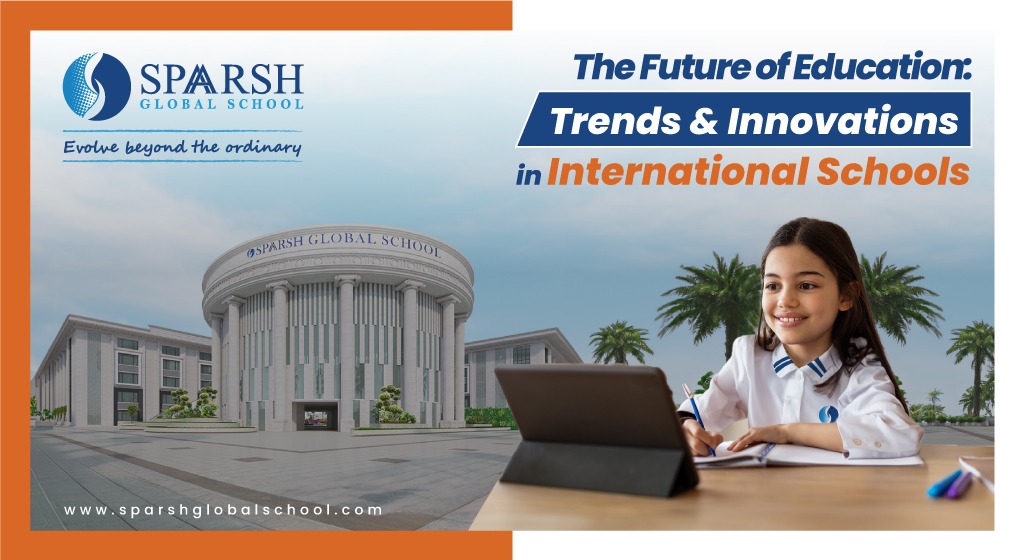International schools are leading the way in educational innovation in a world where everything is changing so fast. These schools are using innovative trends and technology to equip students for success in a world characterised by unique challenges and possibilities. Building resilience, acceptance and global citizenship are pillars of international schools' envisioned future curricula. Here, we examine some of the most encouraging trends and advancements that are influencing the future.

Integration of Technology in Learning
A prominent trend in international education is the extensive use of technology in the learning process. Classrooms are progressively embracing digital technologies like interactive whiteboards, virtual reality (VR) and augmented reality (AR) to establish immersive learning encounters. These tools enhance the learning experience by increasing student engagement and facilitating a more natural and practical exploration of complicated subjects. Such advanced learning tools surpass the traditional wisdom of textbooks and take students on a deep dive into subjects, with real-time exposure.
In addition, Artificial Intelligence (AI) is revolutionising the space in personalised learning. Such systems can provide real-time assessments of students’ performances, given the skills and challenges they have. It also helps educators assess better the needs of each student and design their teaching techniques accordingly.
Project-Based and Experiential Learning
International schools are shifting their focus from memorisation to hands-on learning through projects and experiences. This method pushes students to work on real-life projects that test their analytical, creative and teamwork skills. Students may put their expertise to use by working on sustainable development projects, starting their own businesses, or participating in community service programmes.
Opportunities of field excursions, internships, and industry exposure sum up experiential learning of students. This lends them real-world experience that complements what they learn in the classroom. In addition to increasing their level of involvement, this approach aids students in cultivating important life skills like leadership, flexibility and problem-solving.
Adaptive Technologies
Adaptive technologies are transforming the field of international education by enhancing the effectiveness of personalised learning. These technologies utilise data-driven insights to customise educational content, based on individual student’s requirements and learning speed. In future, international schools will gradually integrate adaptive learning technologies to provide students with personalised assistance and opportunities. This phenomenon not only improves academic achievement but also promotes a more comprehensive atmosphere, accommodating a wide range of learning styles and skills. Adaptive technologies play a crucial role in determining the future of education worldwide.
Gamification
This gradual shift has now led to the emergence of gamification in the education sector around the world, more specifically in international schools. Studies show that using elements of game design improves the level of activity and interest of students. This fresh method transforms the most uninteresting courses into fun, compelling activities which students enjoy; studies have shown that they actually get to learn more and retain the knowledge longer. The application of gamification in international schools has aided in preparation for a tech-dependent future, while making the process of learning enjoyable.
Sustainable and Eco-friendly Practices
As environmental awareness grows, international schools are paving the way for sustainability through their curricula and activities. Schools are minimising trash, conserving energy and supporting sustainable mobility. Solar panels, recycling initiatives and green buildings are quickly becoming standard procedures in most international schools.
Students learn about environmental stewardship and participate in projects to preserve the earth, which reflects their commitment to sustainability through educational programmes. As they teach students to value and protect the planet, international schools are laying the groundwork for future generations of environmentally conscious and responsible citizens.
Conclusion
It can be seen that the future of education, as practised at Sparsh Global School and other international schools, is vibrant and progressing. They cover areas such as the use of technology in programs, diverse cultures, practical experiences and training in environmentally sustainable approaches. Such advances and patterns which are emerging are also not only enhancing training delivery, but also preparing students for a challenging and connected world. SGS, along with other international schools, serves as a compelling model on how education may effectively adjust to cater to the requirements of future global citizens.
FAQ
How are international schools using technology in their education?
International schools extensively use digital technologies to enhance learning. Interactive whiteboards, VR and AR create immersive learning environments. VR may take students to historical locations or natural wonders, making complicated subjects more interesting. AI also analyses student performance in real time and customises instructional content.




